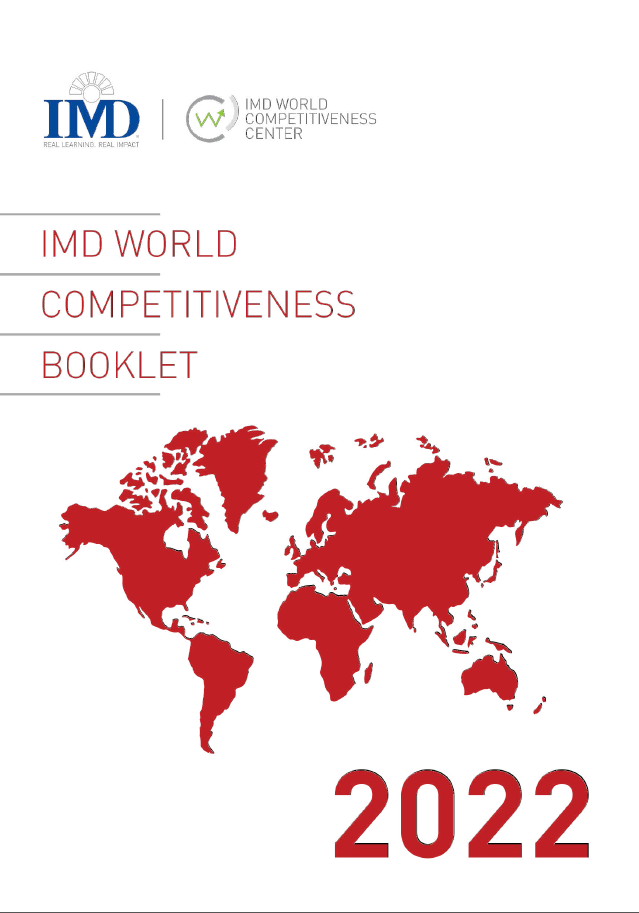Now in its sixth year, the IMD World Digital Competitiveness Ranking, produced by the IMD World Competitiveness Center, measures the capacity and readiness of 63 economies to adopt and explore digital technologies as a key driver for economic transformation in business, government, and wider society.
Based on a mixture of hard data and survey replies from business and government executives, the digital rankings help governments and companies to understand where to focus their resources and what might be best practices when embarking on digital transformation.
2022 results
In digitally competitive economies, cybersecurity measures are top priority for public and private sector, the 2022 IMD World Digital Competitiveness Ranking also found.
Governments and the private sector need to shield their digital infrastructure from cyber attacks if they want to continue in the race for digitally competitive economies. This was a major finding in the 2022 edition of the IMD World Digital Competitiveness Ranking.
All things being equal, economies that want to develop a solid roadmap for digitalization should invest equal amounts in talent, training and education, scientific concentration and R&D.
The yearly ranking – one of four produced in 2022 by the WCC – has seen Denmark take the lead for the first time since the ranking began six years ago. The Scandinavian country ousted the USA, who had to settle for second place – also for the first time since 2017.
“This ranking describes the importance of national factors in explaining the digital transformation of companies and the adoption of digital practices by citizens. Digital nations result from a combination of digital talent, digital regulation, data governance, digital attitudes and the availability of capital,” says Arturo Bris, Director of the WCC.
A total of 63 global economies were studied in terms of their ability to adopt and explore new digital technologies. This year 54 criteria were measured – a mixture of external hard data and the IMD Executive Opinion Survey – and arranged into three major groups: future readiness, knowledge and technology.
Tackling cybersecurity will encourage uptake of e-participation resources
Correlations in the data prove that the safety of digital systems and the transparency of digital actors, especially in terms of data usage, are essential if technology is to be diffused among society; a key example being e-governance.
“Government cybersecurity capacity,” and “privacy protection by law” are two new criteria in the WCC’s data set. Both were supplied by the Digital Society Project.
The WCC said it wanted to include them because “globalization, advancements in the digital technologies field and the global pandemic have, together, made economies more interconnected and have shifted even more parts of our business and personal interactions onto the internet, vastly increasing cyber attacks. Cybersecurity capabilities, both at the company and governmental level, have become of paramount importance.”
Denmark’s triumph is in large part due to its outstanding performance in future readiness: defined by the WCC as “the level of country preparedness to exploit digital transformation”. It performs strongly in business agility (1/63) and in IT integration (1/63), also reaching 5th in its adaptive attitudes.
Denmark remains among the world’s leading economies in digital talent and training and education. And yet, executives’ perceptions about whether or not immigration laws constrain the competitiveness of the country’s private sector were worse than last year.
Elsewhere in the top ten, Sweden remains in 3rd place, and Singapore gains one position, taking 4th. Switzerland moves up to 5th (from 6th).
"Switzerland is on its way to becoming a fully developed digital nation, with satisfactory digital infrastructure and regulation, data governance and digital attitudes. A key success factor for the future though will be the introduction of a digital identity program in the country. The top nations in the ranking, such as Denmark and Singapore, are already marking the way in this sense," said Bris.
The USA (2nd) sees drops across the board, with the largest being in the technology factor. Despite the fact it maintained a relatively strong position, there is much room for improvement in terms of the know-how needed to discover, understand and build new technologies (the “knowledge” factor), the ranking found.
Due to the limited reliability of the data collected, Russia and Ukraine are not included in this edition of the Ranking. Bahrain was a new economy measured in 2022, making its début in June’s IMD World Competitiveness Ranking.
Browse the full report at: https://www.imd.org/centers/world-competitiveness-center/rankings/world-digital-competitiveness/





